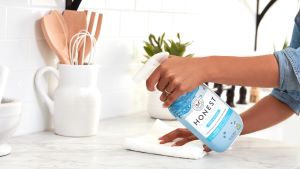- 31 reads

With the growing awareness around the urgency of climate change, there’s been a major societal shift toward embracing sustainability. People are adjusting their living habits to be more eco-friendly, and that includes how they clean their homes.
More small businesses are participating in green initiatives, and an ecologically sustainable approach has never been more marketable. If you’re looking for a way to capitalize on this trend, the time is now to start an eco-cleaning business.
To help you take your first step toward the sustainable business of your dreams, this article has tips, informational resources and examples of ways to start a successful eco-cleaning business. Product selection is just the tip of the slow-melting iceberg your green business is helping to save.
Find Alternatives for Harmful Household Cleaners
Country Living contributor Emma-Louise Pritchard notes that “common cleaning habits often commit a number of environmental sins.” Harmful household cleaners are the primary culprit.
In an interview with Country Living, eco-living expert Katie Tyndale suggests discontinuing the use of cleaning products that contain chemical toxins such as bleach. Not only is bleach damaging to the environment, but it can also adversely affect the user.
Sani Professional warns that despite being a disinfection staple for years, chlorine bleach can damage the respiratory system, eyes, mouth/throat, stomach/GI tract and skin.
Rather than relying on toxic products, Tyndale recommends investing in non-toxic cleaning products and embracing natural stain removers. White vinegar, lemon and bicarbonate of soda are powerful, natural agents with a variety of uses.
Another green cleaning staple is essential oils. Using essential oils such as tea tree oil, rosemary, lavender, eucalyptus and wild orange is a great way to naturally clean and deodorize. Without breaking the bank or harming the environment, you can utilize essential oils to create an antibacterial shield around your clients’ homes.
If you’re not interested in mixing and bottling your own cleaning products, New York Magazine The Strategist contributor Liza Corsillo praises Bon Ami as the best all-natural purpose cleaner. Eco-living expert Cindy DiPrima uses the scrubbing powder to clean everything from bathtubs to tile floors. She appreciates its simple ingredient list which includes limestone, feldspar, soda ash and baking soda.
According to The Good Trade, other eco-friendly household cleaning brands worth checking out are the Grove Collaborative, Method Home, Seventh Generation and Common Good. As an added bonus, many of these companies give back to communities and support social causes.
Getting Your Business Off the Ground
While product selection is important, it’s only the first step to getting your eco-cleaning business off the ground. WorkWave offers a simple 8-step approach for starting a cleaning business.
First and foremost, you should plan on doing the initial cleaning jobs yourself. According to WorkWave, not only will this ensure you keep your costs low, but taking care of clients yourself will help earn you a positive reputation. Your first few jobs are critical for shaping your business image.
The next two steps go hand in hand: setting a reasonable cleaning business budget and deciding what cleaning equipment to purchase. WorkWave notes that the budget for your business should include paying yourself an hourly wage, setting aside money for taxes and investing in supplies. Green cleaning supplies will include natural household cleaners for different areas of your clients’ homes.
Once you’ve decided what eco-friendly equipment and green products you’ll use, it’s time to choose a name for your cleaning company and set up proper licensing for your business. WorkWave suggests choosing a name that is easy to remember and can grow with your operation. Check local and state laws to determine the proper licensing for your cleaning business.
After you’ve taken the steps to ensure your eco-cleaning business is operating lawfully, you need to start marketing your new cleaning company. According to WorkWave, a good place to start is word of mouth, but you can also run advertisements in your local newspaper or online.
Regardless of how you decide to get the word out about your new eco-cleaning business, it’s vital that you make customer service a top priority. WorkWave suggests setting up an email account, a website and social media pages to communicate with clients.
Small Business Skills to Master
The final step to getting your eco-cleaning business off the ground is getting organized to run operations smoothly. WorkWave suggests investing in professional cleaning management software to help oversee your business.
While cleaning software can certainly be helpful, it’s equally important to master skills for running a small business such as accounting. According to Ohio University MACC, essential small business accounting skills include cash accounting, tracking earnings, critical thinking and communication competence.
Mastering these skills will help you establish a reasonable budget and run your eco-cleaning business smoothly.
With these tips and resources in mind, you’re ready to take the first step and start your very own eco-cleaning business.

